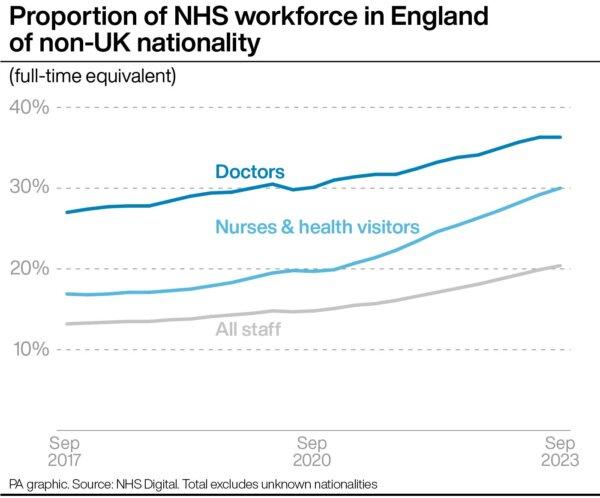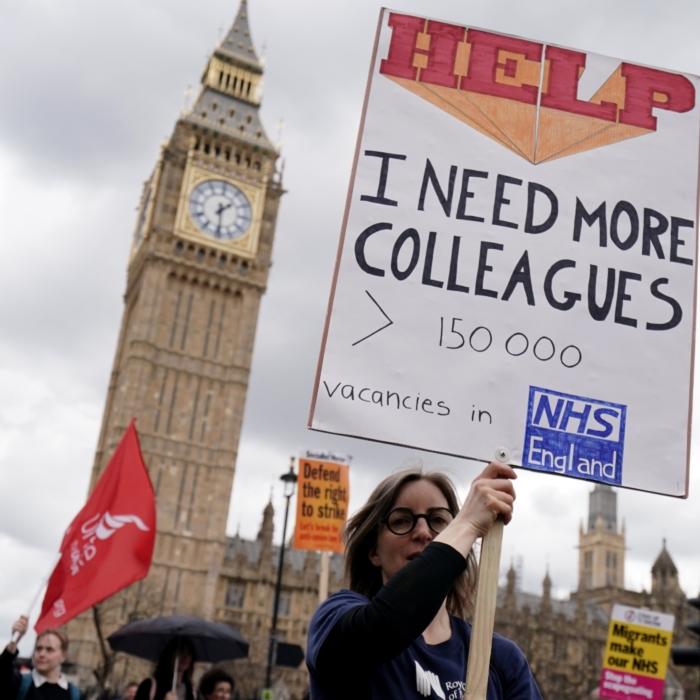A record-breaking one in five NHS roles in England are held by non-UK nationals, with experts warning a reliance on overseas workers is not sustainable.
Analysis by the PA news agency published on Monday found that of the total 1,282,623 full-time equivalent hospital and community health service staff in September 2023 whose nationality was known, an estimated 20.4 percent were foreign nationals.
This is the highest proportion since current data collection began in September 2009, when the figure was 11.9 percent. In 2016, the proportion was 13 percent.
By profession, 30 percent of nurses and health visitors were non-UK nationals, up from 19.7 percent in September 2020. Similarly, more than one-third (36.3 percent) of doctors are foreign nationals, up from 30.1 percent in 2020 and 26.6 percent in 2016.
The most common non-UK nationality was Indian for both doctors and nurses (8 percent) and health visitors (10.1 percent).
The next most common non-UK nationalities of all doctors were Pakistani (3.7 percent), Egyptian (2.9 percent), and Nigerian (2.0 percent). For nurses and health visitors, they were Filipino (7.7 percent), Nigerian (2.5 percent), and Irish (1.1 percent).

Warnings Over Growing Reliance of Foreign Workers
Danny Mortimer, chief executive of NHS Employers, said the analysis showed there was “no room for complacency, as we will not be able to continue to draw on international recruitment to fill NHS vacancies forever.”Mr. Mortimer added: “If anything, retention is just as important as attracting new staff into the NHS and will be key in the short term to preventing pressures from worsening and ensuring the recruitment base we are looking to build from has solid foundations.
“Expanding the number of staff we train here is also important, so it is vital the continued expansion of training and education, set out in the NHS England long-term workforce plan, is maintained.”
Think tanks and health charities have also issued warnings over the UK’s dependence on foreign workers.
The NHS has become “increasingly reliant on overseas recruitment to fill staffing gaps,” said Lucina Rolewicz, researcher at the Nuffield Trust think tank, warning it was “far from a sustainable, long-term solution.”
Ms. Rolewicz said that recruitment of British nationals alone did not represent the sole solution to the issue, citing retention of trained staff as a problem, including the retention of medics from overseas.
According to the Nuffield Trust researcher, nearly two in five (38 percent) non-UK nationals who came to the UK to work in nursing and midwifery had left within five years of joining the professional register.
Plans to Expand Domestic Medical Training
A spokesman from the Department of Health and Social Care said that while international recruitment had proved a “valuable role” in the NHS’s ability to deliver care, the government acknowledged that “it is important we boost the domestic workforce and decrease our reliance on agency staff and overseas workers.”Referencing the government pledge, the spokesman continued that “the plan will double the number of medical school places, almost double the number of adult nurse training places, and increase the number of GP training places by 50 percent by 2031.”
“Through these domestic training expansions, we expect around 10 percent of our workforce to be recruited internationally in 15 years’ time, compared to nearly a quarter today,” he added.
Health care employers had come under criticism in November 2023 for their international recruiting practices, after data from the Nursing and Midwifery Council (NMC) revealed that 24,905 medics from “red list” countries had joined the nursing register in a period of six months.
The government’s Code of Practice for International Recruitment prohibits the active recruitment of medical professionals from certain low-income countries such as Nigeria, Pakistan, and Zambia.
Commenting on the figures, NMC Chief Executive and Registrar Andrea Sutcliffe had said it was “important that employers continue to be mindful of the government’s ethical recruitment code, since we’re seeing many joiners from ’red list' countries.
“People from across the world want to come and work in the UK. However, employers must not undermine health systems in countries with the most pressing workforce challenges through active recruitment.”







